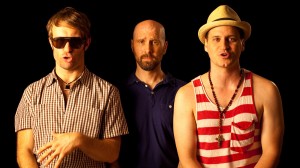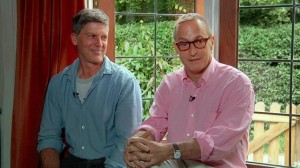 David Thorpe’s investigative documentary, Do I Sound Gay, follows his own personal journey to understand what is meant by the ‘gay voice’, how it occurs and what can be done to change the patters of speech away from this voice. On paper the concept is brilliant; for a long time the concept of the ‘gay voice’ has been a factor that has often stood out or given away when someone is gay. It is often more attributed to a sense of campness or a certain flair in speech, which traditionally is aligned with gay men. And is often a attribute greeted with derision amongst the LGBT community as it previously stood for being lesser than a man. Of course, as Thorpe points out – this isn’t always the case and sometimes this idea of campness can be found in straight men as well. But this film in particular looks into the reasons about why ‘gay voice’ exists, what differentiates it from other pattern of speech and the lengths people will go to often to speak ‘normally’.
David Thorpe’s investigative documentary, Do I Sound Gay, follows his own personal journey to understand what is meant by the ‘gay voice’, how it occurs and what can be done to change the patters of speech away from this voice. On paper the concept is brilliant; for a long time the concept of the ‘gay voice’ has been a factor that has often stood out or given away when someone is gay. It is often more attributed to a sense of campness or a certain flair in speech, which traditionally is aligned with gay men. And is often a attribute greeted with derision amongst the LGBT community as it previously stood for being lesser than a man. Of course, as Thorpe points out – this isn’t always the case and sometimes this idea of campness can be found in straight men as well. But this film in particular looks into the reasons about why ‘gay voice’ exists, what differentiates it from other pattern of speech and the lengths people will go to often to speak ‘normally’.
The biggest issue with this film though is that is quickly loses the trail; the film becomes Thorpe’s story, which is of course a good way to start a documentary to bring an audience in and and to show the filmmaker is invested in the cause but once the technical information is out of the way, the film becomes a personal diary for Thorpe as the audience watch him practice vocal exercises and decide whether having ‘gay voice’ is really such a bad thing. The moments when the film opens up to talk to a range of people about their experiences of coming out, and what the indicators of homosexuality were (including the voice) are often the most interesting. These stories and the information given by the speech coaches that Thorpe visits during the film, who go on to explain some of the patterns in speech that are often bunched together as ‘gay voice’. They even go so far as to discuss family backgrounds and upbringings because it may be that certain parts of speech are down to the environments that you grew up in.
There are a great list of people that Thorpe interviews throughout the film including George Takei, Tim Gunn, David Sedaris, Dan Savage and Margaret Cho who all talk about their own personal experiences of discovering their voice, which are often tender and thoughtful and are the strongest bits of the film. Unfortunately Do I Sound Gay just doesn’t do enough to warrant the feature documentary length time – but instead would have worked as a short television
 film instead. That isn’t too say the film isn’t entertaining or interesting enough, it just doesn’t go as far as one would have hoped. Plus it becomes very difficult to care so much about Thorpe’s own personal journey when it mostly is watching his mouth on screen making different shapes – it gets quite repetitive and arduous. As a film to exist in an festival atmosphere it seems perfect but for a wider audience to catch, it may not sound right.
film instead. That isn’t too say the film isn’t entertaining or interesting enough, it just doesn’t go as far as one would have hoped. Plus it becomes very difficult to care so much about Thorpe’s own personal journey when it mostly is watching his mouth on screen making different shapes – it gets quite repetitive and arduous. As a film to exist in an festival atmosphere it seems perfect but for a wider audience to catch, it may not sound right.




